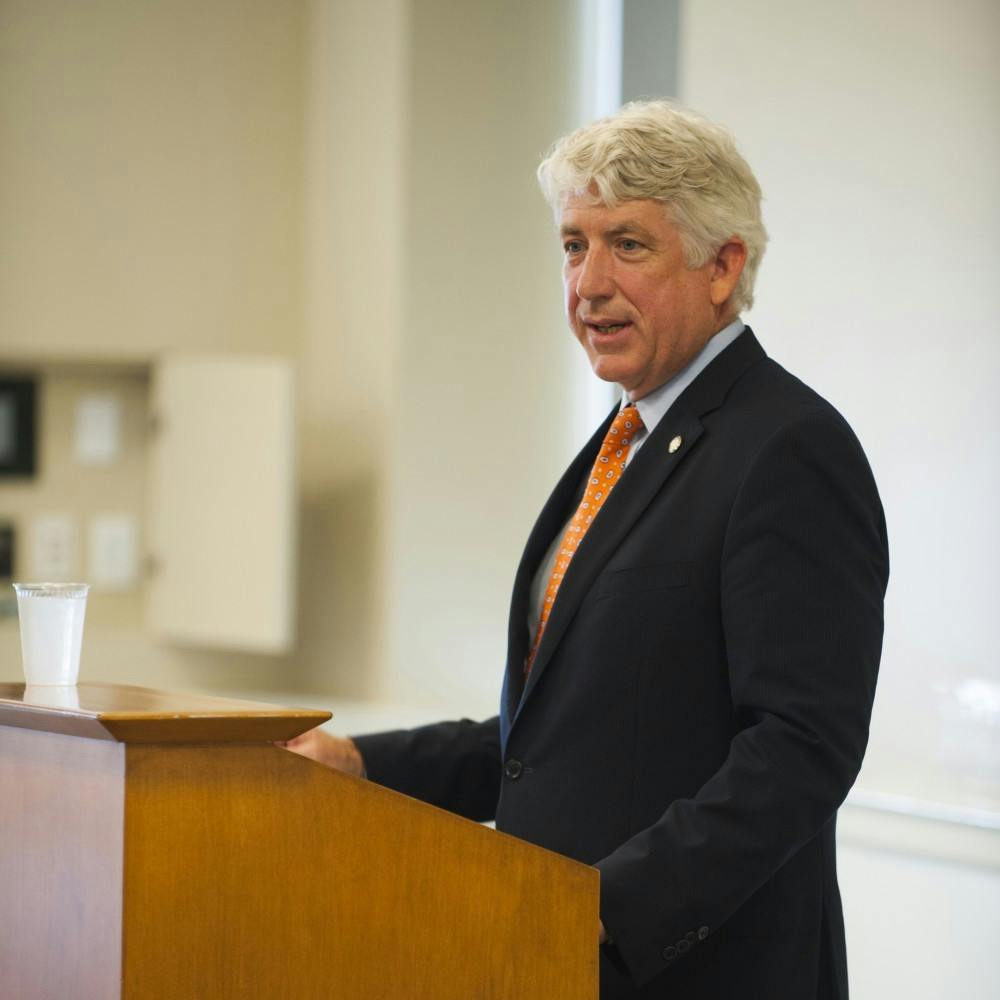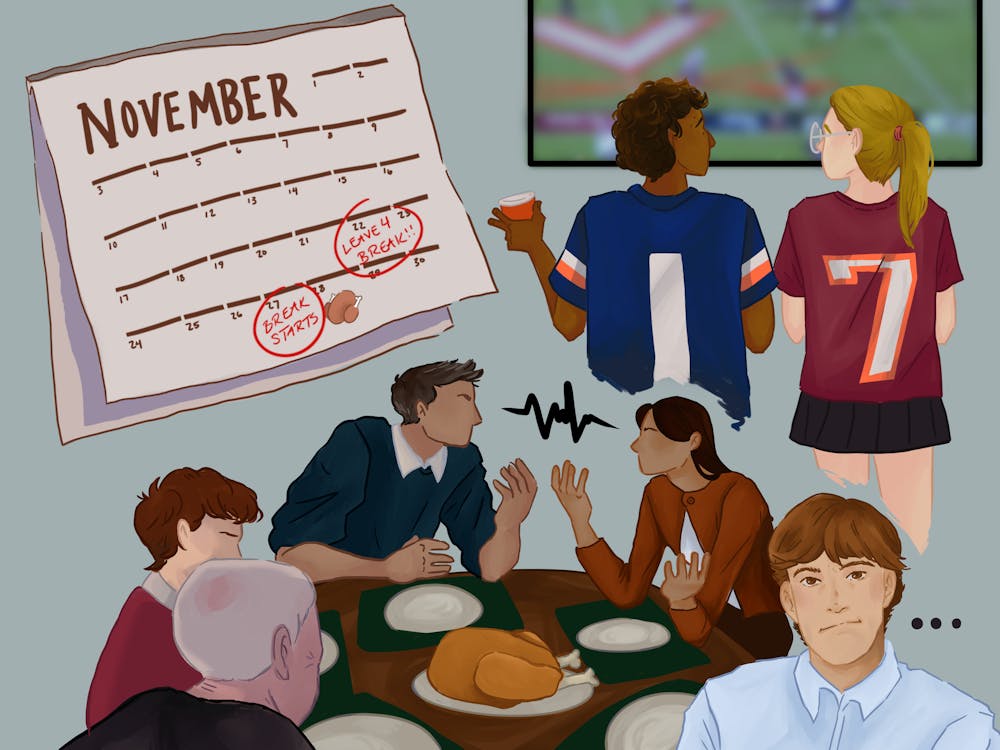Attorney General Mark Herring (D-Va.) announced Wednesday that he dressed in blackface for a party while a student at the University in 1980. In the past week, he is the second elected official from Virginia to admit to imitating an African-American person.
“In 1980, when I was a 19-year-old undergraduate in college, some friends suggested we attend a party dressed like rappers we listened to at the time, like Kurtis Blow, and perform a song,” Herring said in a statement. “It sounds ridiculous even now writing it. But because of our ignorance and glib attitudes — and because we did not have an appreciation for the experiences and perspectives of others — we dressed up and put on wigs and brown makeup.”
Herring’s statement comes as Gov. Ralph Northam (D-Va.) is facing pressure to resign after a photo emerged on his 1984 medical school yearbook page featuring one person in blackface and another person in a Ku Klux Klan robe. Northam said he was not in this photo but admitted to wearing blackface to imitate Michael Jackson at a dance contest while a student at Eastern Virginia Medical School in 1984.
“That I have contributed to the pain Virginians have felt this week is the greatest shame I have ever felt,” Herring said in the statement. He apologized for his actions but did not indicate whether he would remain in office.
“That conduct clearly shows that, as a young man, I had a callous and inexcusable lack of awareness and insensitivity to the pain my behavior could inflict on others,” Herring said. “It was really a minimization of both people of color, and a minimization of a horrific history I knew well even then.”
The University issued a statement Wednesday night in response to Herring’s use of blackface while a student, calling it “racist and offensive.”
“This latest revelation underscores how important it is to continue honest conversations about our past, whether distant or not-so-distant, and how that past continues to influence our present,” the University’s statement said. “Those conversations have been occurring at UVA for a number of years, and they will continue.”
Larry Sabato, director of the University’s Center for Politics, said on Twitter that everyone connected to the University should be “embarrassed” that Herring used blackface while a student.
“My guess is this wasn’t an isolated incident,” Sabato wrote. “A certain element here has long thought blackface was amusing and acceptable. I favor automatic expulsion for any student engaging in this disgraceful conduct.”
Sabato added that current University students should learn from these scandals. “What you do in high school and college isn’t off limits later in life,” he wrote.
Corks & Curls — the University’s official yearbook — contains several images of students wearing blackface and yellowface throughout the University’s history. An image in the 1983 edition shows an unnamed student dressed in a costume possibly mocking a lynching victim for Halloween. According to The Washington Post, the yearbook’s name is a reference to the burned cork used to blacken faces in minstrelsy and the curly Afro wigs used in costumes.
“Universities are places dedicated to discovering and disseminating the truth, and it is in that [spirit] that we should examine our own past — including the past documented in University publications — and our present,” the University said in its statement.
According to Sabato’s Crystal Ball — a nonpartisan political analysis newsletter run by the Center for Politics — Herring would become governor in the event that both Northam and Lt. Gov. Justin Fairfax (D-Va.) resign. Fairfax currently faces an allegation of sexual assault, which he denied. His accuser went public Wednesday afternoon with claims stating Fairfax assaulted her at the 2004 Democratic convention in Boston.
Kyle Kondik, managing editor for Sabato's Crystal Ball and director of communications for the Center for Politics, told The Cavalier Daily that if all three officials decided to resign, it is likely they would do so in a way that allows Democrats to maintain control of the governorship. However, he added that it’s not clear any of them will resign.
“Northam seemed close to being pushed out, but the problems with Fairfax and Herring have relieved some of the pressure on him,” Kondik said in an email.
“I cannot think of a comparable situation to this in Virginia or, frankly, in any state,” Kondik said. “For the governor and the first and second in line to the governorship to all be rocked by scandal simultaneously is an extraordinarily odd occurrence.”
The University Democrats — who organized events and helped campaign for Northam, Fairfax and Herring — released a statement Wednesday night denouncing their actions and calling on them to resign.
“These three individuals have lost their credibility, respect, and moral standing among Virginians,” the University Democrats’ statement said. “This demand does not mean we support Republicans taking over Virginia’s statewide offices. We urge the individuals involved to craft a solution that respects the will of the Virginians who elected them.”
Jackson Samples, third-year College student and president of University Democrats, told The Cavalier Daily the Democrats need to condemn racism and sexual assault, but also need to propose policy to tackle systemic issues.
“If Democrats are up to the difficult challenge of fulfilling these actions, and in doing so working to regain the trust and support that has been lost in recent days, I do not anticipate the Commonwealth turning red anytime soon,” Samples said in an email.
Herring — who was raised in Leesburg, Va. — attended the University from 1979 to 1983, graduating with a Bachelor of Arts in foreign affairs and economics. He also obtained a Master of Arts in foreign affairs from the University in 1986. Herring was first elected Attorney General in 2013 and won reelection in 2017 over Republican opponent John Donley Adams.
The University — which has examined its earliest days through the President’s Commission on Slavery and the University — recently launched the President’s Commission on the University in the Age of Segregation, which is focused on the time period after the Civil War and through the Civil Rights era.
“We do not need a commission or a study to make the basic point that dressing in blackface is wrong,” the University’s statement said. “Nor should we shy away from the responsibility of ensuring that our current students understand the painful history of blackface and other forms of cultural appropriation or disrespect.”
Correction: This article previously stated that an image of an unnamed student dressed as a lynching victim was found in the 1983 edition of Corks and Curls. The article has since been updated to reflect the identification of the student’s costume as a possible interpretation of a lynching victim.





